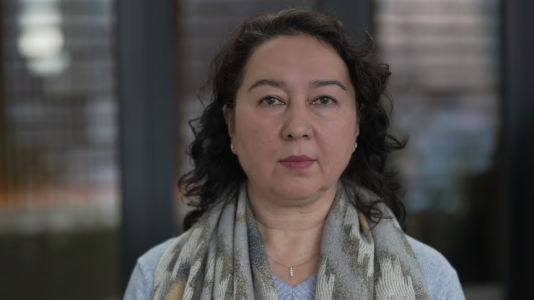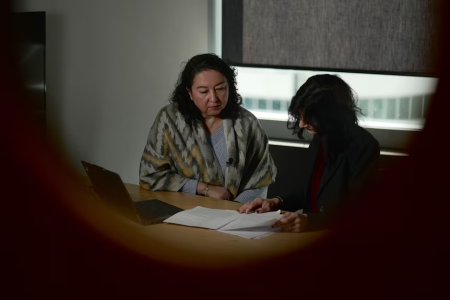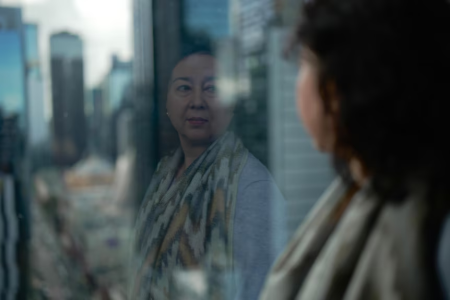Kmart denies sourcing any products from factories linked to forced labour in China
By
ABC News
- Replies 13
Kmart is facing legal action in the federal court, taken by an Australian-based Uyghur group, who say they have a reasonable belief the retail giant may be sourcing some of its products from factories linked to forced labour camps in Western China.
Kmart says that belief is wrong.
Ramila Chanisheff, representing the Australian Uyghur Tangritagh Women's Association (AUTWA), has sought documents from Kmart — requesting the retailer prove its public claims of operating a "sustainable" and "ethical" company, with products free from slavery or forced-labour.
The court action is seeking documents relating to Kmart's supply chains that could be linked to labour in the Uyghur homeland, now known as the Xinjiang region.
Ms Kanis said the case was testing whether Kmart was engaging in misleading or deceptive conduct under consumer law in relation to the ethical nature of the products, with the company's "ethical sourcing code" listed throughout its website.
Australia, unlike the United States and some European nations, does not prohibit goods imported from China's Xinjiang region.
The US has banned goods from that region since 2021, over credible evidence that many products are manufactured there using forced labour — particularly involving Uyghur Muslims and other minority groups.
Jennifer Kanis, a solicitor from Maurice Blackburn representing AUTWA, said the legal case was designed to compel Kmart to, "prove their public position".
By cross-referencing Kmart's supplier list with "numerous credible reports" connecting companies in the Xinjiang region to forced labour, the plaintiffs say they will allege they found a match for at least two factory suppliers.
The application alleges at least two garment suppliers are linked to the use of Uyghur forced labour in the Uyghur region.
In a statement, Kmart said it was disappointed AUTWA took this course of action and had invited the association to meet with them "several times" to understand their concerns.
"Kmart has been in correspondence with the applicant's lawyers for over 12 months and has provided extensive details of our Ethical Sourcing Program," the spokesperson said.
"For over 15 years, we have had in place an Ethical Sourcing Program, which helps us to identify and mitigate modern slavery risks, including the risk of forced labour, in our operations and supply chains.
"Suppliers in the Kmart Ethical Sourcing Program are regularly monitored through activities including our site visits, audit programs and investigations if we receive any reports or complaints of concern."
The spokesperson also said it was the first Australian retailer to publicly disclose its factory list on its website for transparency.
The Chinese Government has repeatedly denied these claims.
Freya Dinshaw from the Human Rights Law Centre, said alarm bells had been "ringing for a long time" regarding forced labour risks, especially in the Chinese garment industry, and pointed out that "85 per cent of the cotton in China comes from the Xinjiang region".
Australian retailers, she said, "have been on notice for some time" regarding these risks.
Professor Justine Nolan of the Australian Human Rights Institute said while Australia was considered a leader when it introduced the Act in 2018, the law primarily imposed a mandatory reporting obligation for large companies (those with over $100 million in annual consolidated revenue) to identify modern slavery risks, but not an obligation to act on those findings.
And a quarter of Australian companies were not complying with their basic reporting requirements, because there is "no significant enforcement framework," according to a Federal Government review led by John McMillan in 2023,
"A non-compliance rate of 25 per cent just by false reporting or not reporting: that shows that the law that we currently have are not sufficient and that we really do need reforms," Professor Nolan said.
She said other jurisdictions, such as the European Union and the United States, have moved further, adopting laws that mandated human rights due diligence and implementing forced labour import bans, which Australia lacks.
A 2023 independent review of the Act confirmed deep inadequacies and found that "no meaningful change had been shown for people at the greatest risk of modern slavery."
Last month the Australian Government released a consultation paper aiming to strengthen the Modern Slavery Act, focusing on streamlining existing mandatory reporting criteria.
"The reforms they are proposing are useful, not sufficient," Professor Nolan said.
"We're still not tackling the root causes of the problem and we need to think about introducing an obligation to act, not just an obligation to report."
Australia continues to import an estimated $27 billion worth of goods at risk of forced labour into the country every year with no laws that would prevent the importation of such goods, according to a 2023 report from human rights group Walk Free, an arm of Andrew Forrest's Minderoo Foundation.
Ramila Chanisheff said if Kmart could prove beyond doubt that they were not linked to forced labour, the association would be satisfied.
However, if links were found, AUTWA's call to action would be for Kmart to "divest" from those suppliers.
"You can get your cotton from elsewhere," she said.
Ms Kanis, said a successful outcome would be greater transparency and accountability in relation to being able to make claims about ethical sourcing, ensuring these were not "empty claims".
Professor Nolan said without stronger laws, Australia risks becoming a "dumping ground" for goods made with forced labour if other countries implement effective import bans.
She also noted a "willingness among Australian companies to go further" and align with global standards, but the current modern slavery law, introduced to federal parliament in 2018 is "not sufficient".
"Seven years is a long time to wait for people who are working in modern slavery every day," she said.
In a statement, the Attorney-General Michelle Rowland said the federal government "is committed to combating modern slavery" and "its immediate priority is implementing its response to the statutory review of the Act to strengthen its operation."
Minister Rowland also said the public consultation process "will inform the development of balanced measures to support and incentivise Australian businesses to take actions to eliminate modern slavery risks and practices, and combat them in their supply chains."
Editor's note 5/08/2025: This story was changed to clarify that the legal action itself does not contain allegations that Kmart has sourced products from factories linked to forced labour, but rather that the group taking the legal action is doing so because it believes such a link may exist.
By national work reporter Bronwyn Herbert and Specialist Reporting Team's Lucy Kent
Kmart says that belief is wrong.
The court action is seeking documents relating to Kmart's supply chains that could be linked to labour in the Uyghur homeland, now known as the Xinjiang region.
Ms Kanis said the case was testing whether Kmart was engaging in misleading or deceptive conduct under consumer law in relation to the ethical nature of the products, with the company's "ethical sourcing code" listed throughout its website.
Australia, unlike the United States and some European nations, does not prohibit goods imported from China's Xinjiang region.
The US has banned goods from that region since 2021, over credible evidence that many products are manufactured there using forced labour — particularly involving Uyghur Muslims and other minority groups.
Jennifer Kanis, a solicitor from Maurice Blackburn representing AUTWA, said the legal case was designed to compel Kmart to, "prove their public position".
By cross-referencing Kmart's supplier list with "numerous credible reports" connecting companies in the Xinjiang region to forced labour, the plaintiffs say they will allege they found a match for at least two factory suppliers.
The application alleges at least two garment suppliers are linked to the use of Uyghur forced labour in the Uyghur region.
In a statement, Kmart said it was disappointed AUTWA took this course of action and had invited the association to meet with them "several times" to understand their concerns.
"For over 15 years, we have had in place an Ethical Sourcing Program, which helps us to identify and mitigate modern slavery risks, including the risk of forced labour, in our operations and supply chains.
"Suppliers in the Kmart Ethical Sourcing Program are regularly monitored through activities including our site visits, audit programs and investigations if we receive any reports or complaints of concern."
The spokesperson also said it was the first Australian retailer to publicly disclose its factory list on its website for transparency.
Alarm bells 'ringing for a long time'
Human rights groups and the United Nations have previously accused China of committing crimes against humanity and possible genocide against the Uyghur population and other mostly-Muslim ethnic groups in the north-western region of Xinjiang.The Chinese Government has repeatedly denied these claims.
Freya Dinshaw from the Human Rights Law Centre, said alarm bells had been "ringing for a long time" regarding forced labour risks, especially in the Chinese garment industry, and pointed out that "85 per cent of the cotton in China comes from the Xinjiang region".
Australian retailers, she said, "have been on notice for some time" regarding these risks.
Companies must be forced to act
The allegations against Kmart also sheds light on the potential shortcomings of Australia's current Modern Slavery Act.Professor Justine Nolan of the Australian Human Rights Institute said while Australia was considered a leader when it introduced the Act in 2018, the law primarily imposed a mandatory reporting obligation for large companies (those with over $100 million in annual consolidated revenue) to identify modern slavery risks, but not an obligation to act on those findings.
And a quarter of Australian companies were not complying with their basic reporting requirements, because there is "no significant enforcement framework," according to a Federal Government review led by John McMillan in 2023,
"A non-compliance rate of 25 per cent just by false reporting or not reporting: that shows that the law that we currently have are not sufficient and that we really do need reforms," Professor Nolan said.
She said other jurisdictions, such as the European Union and the United States, have moved further, adopting laws that mandated human rights due diligence and implementing forced labour import bans, which Australia lacks.
Last month the Australian Government released a consultation paper aiming to strengthen the Modern Slavery Act, focusing on streamlining existing mandatory reporting criteria.
"The reforms they are proposing are useful, not sufficient," Professor Nolan said.
"We're still not tackling the root causes of the problem and we need to think about introducing an obligation to act, not just an obligation to report."
Australia continues to import an estimated $27 billion worth of goods at risk of forced labour into the country every year with no laws that would prevent the importation of such goods, according to a 2023 report from human rights group Walk Free, an arm of Andrew Forrest's Minderoo Foundation.
However, if links were found, AUTWA's call to action would be for Kmart to "divest" from those suppliers.
"You can get your cotton from elsewhere," she said.
Ms Kanis, said a successful outcome would be greater transparency and accountability in relation to being able to make claims about ethical sourcing, ensuring these were not "empty claims".
Consumers can make a difference
Ms Chanisheff, who was born in East Turkestan/Xinjiang, but raised in Australia, still has family and friends in the province. She believes Australians do care about how their products and that "consumers can make a difference".Professor Nolan said without stronger laws, Australia risks becoming a "dumping ground" for goods made with forced labour if other countries implement effective import bans.
She also noted a "willingness among Australian companies to go further" and align with global standards, but the current modern slavery law, introduced to federal parliament in 2018 is "not sufficient".
"Seven years is a long time to wait for people who are working in modern slavery every day," she said.
In a statement, the Attorney-General Michelle Rowland said the federal government "is committed to combating modern slavery" and "its immediate priority is implementing its response to the statutory review of the Act to strengthen its operation."
Editor's note 5/08/2025: This story was changed to clarify that the legal action itself does not contain allegations that Kmart has sourced products from factories linked to forced labour, but rather that the group taking the legal action is doing so because it believes such a link may exist.
By national work reporter Bronwyn Herbert and Specialist Reporting Team's Lucy Kent











